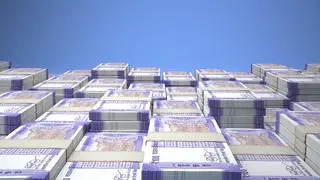The Western media recently carried news items such as ‘India is snapping up cheap Russian oil’ and ‘India’s Russian oil buy: Red flag of red herring’ to censure us. Some in the media even called it an “opportunistic buy”. Yes, it is an opportunistic buy in a world where oligopolies control supplies.
It is only natural that when offered a lower price compared to others, India opted to buy Russian oil. From the Western perspective, India’s decision amounts to refusing to toe the line of the US and its NATO allies. From India’s standpoint, the objective is not to hurt its economy recovering from the deadly Covid pandemic.
When it comes to meeting its energy needs, India does not have allies who are valued either in terms of the prices offered or in making petro-products available in a timely manner.
In a world that has become more polarised economically since the pandemic, with the gap between the rich and the poor widening, soaring energy prices shouldn’t make the situation worse. While Russia’s military action is condemnable from a humanitarian perspective, should India push its economy into a crisis by toeing the Western line?
Why is the Western media turning a blind eye to the continuing US/EU imports of Russian uranium/gas?
Additionally, India’s dependence on Russia for commodities such as oil and gas has historically been low compared with that of the NATO nations. In fact, despite the animosity, the EU’s dependence on Russian energy has been increasing in the last few years.
Before the recent ban, even the US had been importing crude oil from Russia. Also, the US was importing about 16 per cent of its uranium requirements from Russia until last year, and it still continues despite a Bill being introduced in the Senate to stop the same.
There is an economic logic to India’s decision to purchase Russian oil. Energy prices are critical for the country, given its inclusive growth aspirations. What drove energy prices to where they are now? Obviously, the stubbornness of OPEC against bolstering supplies kept pushing up market prices.
And why is oil demand stubborn even at such high prices? This is because of the till now loose monetary policy and low interest rate regime led by developed nation central banks, and the efforts of the policymakers to keep the funds tap open to sustain the recovery from the pandemic. These have led to increased direct and indirect demand for energy and crude-based products.
Emerging from the pandemic with limited room for fiscal/monetary profligacy, there wasn’t a better option for India than accept the oil deal when offered at a discount. To tackle the rising inflation, policymakers need to reduce energy import costs.
The cost of nitrogenous fertilisers, an essential input in agriculture, which is the lifeline for millions of small farmers, has also gone up. Further, global food prices are also at an all-time high, as indicated by the FAO Food Price Index of March.
If Europe wants to protect its economy with access to Russian gas, one cannot understand the rationale behind the Western media’s criticism of India’s negligible oil imports from Russia. The EU still imports around $1 billion worth of crude oil every day from Russia.
The way out
With India being the second most populous country and among the top ten nations in terms of GDP, access to energy at affordable prices is essential to ensure inclusive growth. India must replenish its granaries without adding to food inflation, and energy costs hold the key.
Having been kept away from Iranian oil for so long and Russian oil now, significantly affecting supplies in the process, it is time global leaders looked at reducing OPEC’s oligopolistic control over oil supplies by demanding, say, a 30 per cent discount on their supplies through a multilateral arrangement. This will not only make energy accessible but also affordable.
The world must find a better way to punish the perpetrators of humanitarian crises. They must be made liable to pay for the costs involved in rebuilding the affected nations by mandating that the payment from trade be partially deposited into an escrow account to be managed by the United Nations.
Further, a nuanced global tariff arrangement for imports from politically sensitive nations with a record of trans-border offences, support for terrorism and indirect support to inhuman activities such as child labour may be put in place.
To promote global peace, a multilateral trade/tariff/payments arrangement would be better than using unilateral tools such as economic sanctions.
The writer is with the National Institute of Securities Markets. Views are personal








Comments
Comments have to be in English, and in full sentences. They cannot be abusive or personal. Please abide by our community guidelines for posting your comments.
We have migrated to a new commenting platform. If you are already a registered user of TheHindu Businessline and logged in, you may continue to engage with our articles. If you do not have an account please register and login to post comments. Users can access their older comments by logging into their accounts on Vuukle.